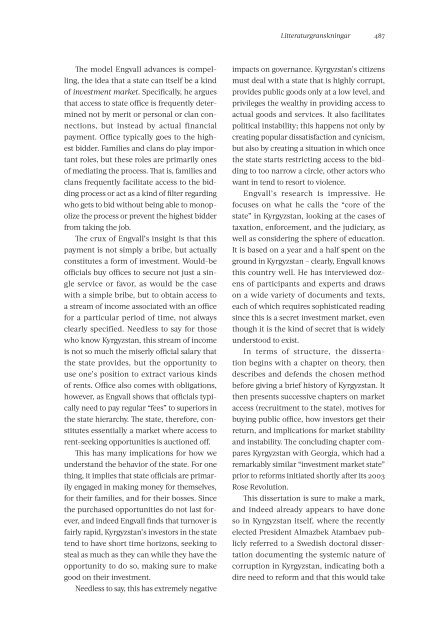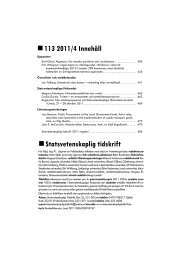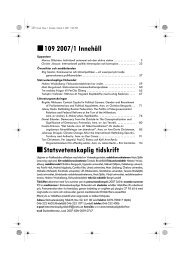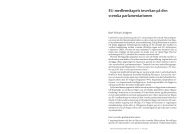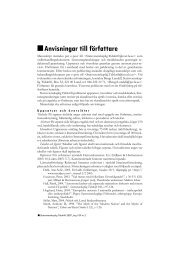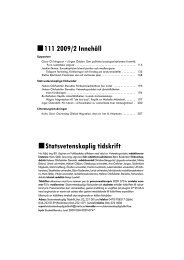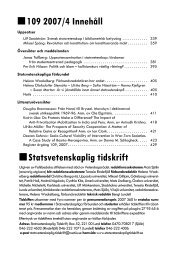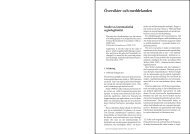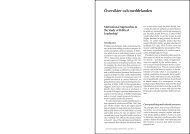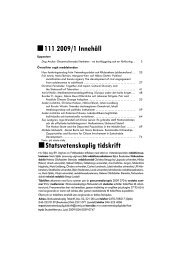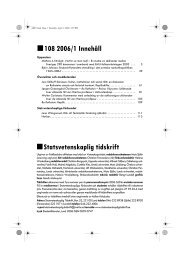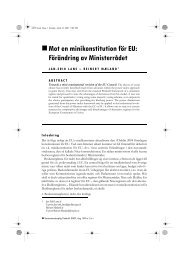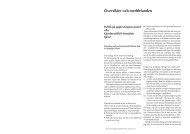Helt nummer 2012/3 (PDF, 1387 kb) - Statsvetenskaplig tidskrift
Helt nummer 2012/3 (PDF, 1387 kb) - Statsvetenskaplig tidskrift
Helt nummer 2012/3 (PDF, 1387 kb) - Statsvetenskaplig tidskrift
You also want an ePaper? Increase the reach of your titles
YUMPU automatically turns print PDFs into web optimized ePapers that Google loves.
The model Engvall advances is compel-<br />
ling, the idea that a state can itself be a kind<br />
of investment market. Specifically, he argues<br />
that access to state office is frequently deter-<br />
mined not by merit or personal or clan con-<br />
nections, but instead by actual financial<br />
payment. Office typically goes to the high-<br />
est bidder. Families and clans do play impor-<br />
tant roles, but these roles are primarily ones<br />
of mediating the process. That is, families and<br />
clans frequently facilitate access to the bid-<br />
ding process or act as a kind of filter regarding<br />
who gets to bid without being able to monop-<br />
olize the process or prevent the highest bidder<br />
from taking the job.<br />
The crux of Engvall’s insight is that this<br />
payment is not simply a bribe, but actually<br />
constitutes a form of investment. Would-be<br />
officials buy offices to secure not just a sin-<br />
gle service or favor, as would be the case<br />
with a simple bribe, but to obtain access to<br />
a stream of income associated with an office<br />
for a particular period of time, not always<br />
clearly specified. Needless to say for those<br />
who know Kyrgyzstan, this stream of income<br />
is not so much the miserly official salary that<br />
the state provides, but the opportunity to<br />
use one’s position to extract various kinds<br />
of rents. Office also comes with obligations,<br />
however, as Engvall shows that officials typi-<br />
cally need to pay regular “fees” to superiors in<br />
the state hierarchy. The state, therefore, con-<br />
stitutes essentially a market where access to<br />
rent-seeking opportunities is auctioned off.<br />
This has many implications for how we<br />
understand the behavior of the state. For one<br />
thing, it implies that state officials are primar-<br />
ily engaged in making money for themselves,<br />
for their families, and for their bosses. Since<br />
the purchased opportunities do not last for-<br />
ever, and indeed Engvall finds that turnover is<br />
fairly rapid, Kyrgyzstan’s investors in the state<br />
tend to have short time horizons, seeking to<br />
steal as much as they can while they have the<br />
opportunity to do so, making sure to make<br />
good on their investment.<br />
Needless to say, this has extremely negative<br />
Litteraturgranskningar 487<br />
impacts on governance. Kyrgyzstan’s citizens<br />
must deal with a state that is highly corrupt,<br />
provides public goods only at a low level, and<br />
privileges the wealthy in providing access to<br />
actual goods and services. It also facilitates<br />
political instability; this happens not only by<br />
creating popular dissatisfaction and cynicism,<br />
but also by creating a situation in which once<br />
the state starts restricting access to the bid-<br />
ding to too narrow a circle, other actors who<br />
want in tend to resort to violence.<br />
Engvall’s research is impressive. He<br />
focuses on what he calls the “core of the<br />
state” in Kyrgyzstan, looking at the cases of<br />
taxation, enforcement, and the judiciary, as<br />
well as considering the sphere of education.<br />
It is based on a year and a half spent on the<br />
ground in Kyrgyzstan – clearly, Engvall knows<br />
this country well. He has interviewed doz-<br />
ens of participants and experts and draws<br />
on a wide variety of documents and texts,<br />
each of which requires sophisticated reading<br />
since this is a secret investment market, even<br />
though it is the kind of secret that is widely<br />
understood to exist.<br />
In terms of structure, the disserta-<br />
tion begins with a chapter on theory, then<br />
describes and defends the chosen method<br />
before giving a brief history of Kyrgyzstan. It<br />
then presents successive chapters on market<br />
access (recruitment to the state), motives for<br />
buying public office, how investors get their<br />
return, and implications for market stability<br />
and instability. The concluding chapter com-<br />
pares Kyrgyzstan with Georgia, which had a<br />
remarkably similar “investment market state”<br />
prior to reforms initiated shortly after its 2003<br />
Rose Revolution.<br />
This dissertation is sure to make a mark,<br />
and indeed already appears to have done<br />
so in Kyrgyzstan itself, where the recently<br />
elected President Almazbek Atambaev pub-<br />
licly referred to a Swedish doctoral disser-<br />
tation documenting the systemic nature of<br />
corruption in Kyrgyzstan, indicating both a<br />
dire need to reform and that this would take


